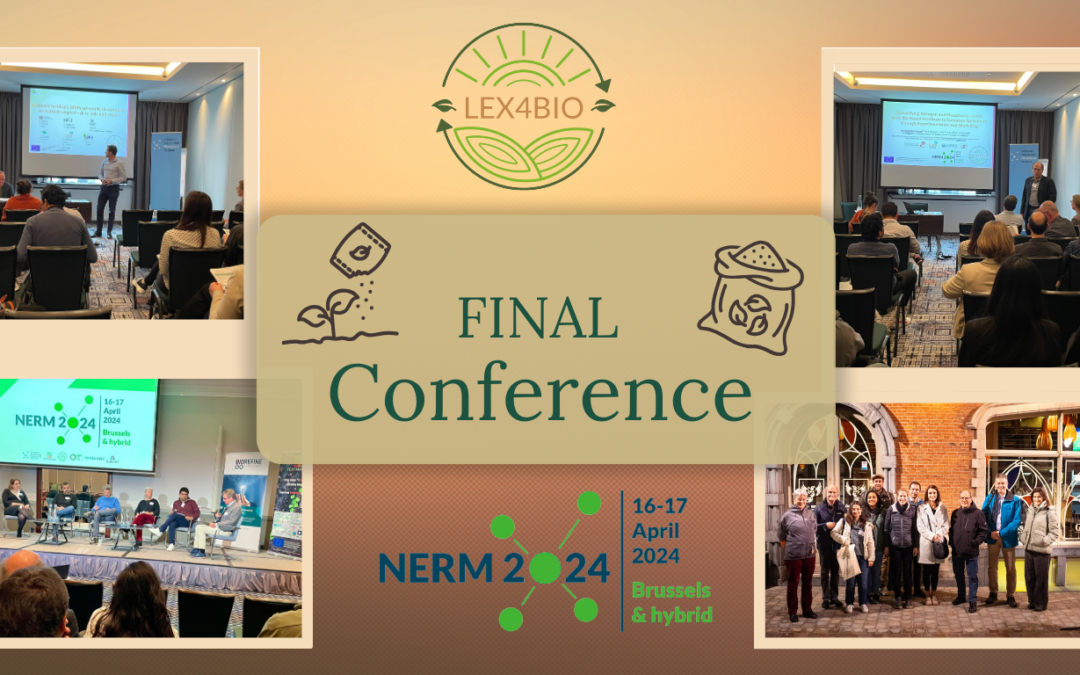PROJECT’S FINAL CONFERENCE
Nutrients in Europe Research Meeting (NERM), co-organized by ESPP, FERTIMANURE, LEX4BIO, RUSTICA, SEA2LAND and WALNUT projects funded under Horizon 2020 Programme (RUR-08), took place in Brussels on April 16 and 17, 2024 with the ambition to outline the path towards closing nutrient cycles for a sustainable future under the tagline “From R&D to implementation”. An engaging and enriching two-day experience, disseminating key outcomes of latest research on nutrient recovery technologies and recycled fertilizer production, but also deliberating on the quality, application and stakeholder acceptance of secondary fertilizers as well as sketching a roadmap for future nutrient and fertilizer recycling R&D needs.
The morning plenary session opened by Luis Sanchez Alvarez, DG AGRI, highlighted the importance of research and innovation for decreasing Europe’s dependence on imported fertilizers, improving agricultural and soil management practices and the inefficient use of fertilizers. In the context of projects working on innovative solutions, he emphasized the necessity to accelerate the uptake of the new technologies and new business models by the industry and end-users through testing the novelties in the real environment of living labs and transferring those proving successful to individual farms to demonstrate exemplary practices, train others and increase the awareness of the importance of soil management.
With six parallel session presentations, LEX4BIO speakers walked conference participants through the whole lifecycle of the project, with talks on nitrogen (N) and phosphorus (P) biobased fertilizers’ (BBF) agronomic performance, findings on potential risks of BBF use posed to soils and crops, the availability of nutrient rich side streams and the effect of BBFs on crop growth, quantification of P and N losses through experimentation and modeling, and last but not least, the environmental and socio-economic impact of BBFs.
Conclusions derived from the project
- BBFs can function as fully or partially effective replacement for mineral N and P fertilizers
- Phosphorus demand of European croplands is below current P fertilizer recommendations and can largely be covered by P recycling products
- Environmental implications of BBF application are generally less or similar to synthetic mineral fertilisers and vary between soils, BBFs and cropping systems
- BBF contaminant levels were found to be overall far below national EU member state benchmarks and BBFs studied generally do not pose a risk of disseminating antibiotic resistance in the soil
- Addressing barriers for BBF uptake requires collaborative efforts from policymakers, researchers, industry, stakeholders and farmers themselves
Expert panelists unanimously agreed that more research is needed to answer definitively the question whether BBFs can have potential to fully replace current mineral fertilizing products. The showcased existing networks and platforms for sharing and disseminating agricultural knowledge and innovation, certainly provide for greater impact and advance of research, especially post projects’ lifespan.
The overarching message conveyed: actors across the value chain should all act as facilitators, bridging the knowledge-to-application gap by collecting, translating and making knowledge in the nutritional management visible and understandable to practitioners.
LEX4BIO project ends on 31 May 2024. Its website and social accounts on Facebook, LinkedIn and Twitter will remain active for two years.


